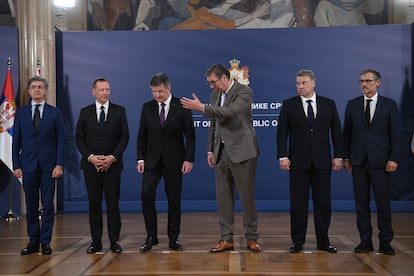European Union presses the leaders of Serbia and Kosovo to set decades of enmity behind them
Fears are high of a resumption of the violence that has marked their relations since Kosovo unilaterally broke away from Serbia in 2008

The European Union on Thursday ramped up pressure on Serbia and Kosovo to normalize their relations by enlisting the leaders of three heavyweight member countries and senior officials to make a major push to get the former war foes to set aside decades of differences.
Serbian President Aleksandar Vucic and Prime Minister Albin Kurti distrust each other and were not expected to meet face to face. But they did hold talks separately with the leaders of France, Germany and Italy, plus the two EU officials supervising a stuttering “dialogue” between them.
EU foreign policy chief Josep Borrell told reporters that “work is ongoing” after a first round of talks and that more meetings might be needed on Thursday. Italian Prime Minister Giorgia Meloni said only that she, French President Emmanuel Macron and German Chancellor Olaf Scholz had urged “both leaders to take steps forward” toward normalizing their ties.
The meetings in Brussels come on the sidelines of an EU summit. Fears are high of a resumption of the violence that has marked their relations since Kosovo unilaterally broke away from Serbia in 2008. Belgrade still considers Kosovo a Serbian province and has never recognized its independence. Both Kosovo and Serbia want to join the EU, but they’ve been warned that they must sort out their differences first.
The Europeans have been spurred into action by a major gun battle in northern Kosovo on Sept. 24, when about 30 Serb gunmen crossed into northern Kosovo, killed a police officer and set up barricades. Three gunmen were killed in the shootout with Kosovo police.
Thursday’s talks were aimed at putting into action an agreement that Vucic and Kurti reached in February, although the two have raised issues concerning that deal since. The idea is to work on new “proposals and ideas” floated in exploratory talks last weekend, said Peter Stano, the spokesman for Borrell, chief supervisor of the Belgrade-Pristina Dialogue.
“I hope for a good atmosphere, but it won’t be easy,” Vucic told Serbian state television network RTS on the eve of the meetings. “We are most certainly open for discussion, and they are knocking on an open door.” The big problem is that neither he nor Kurti want to be the first to make concessions without guarantees that the other will reciprocate.
The EU and U.S. are pressing Kosovo to allow the creation of an Association of the Serb-Majority Municipalities to coordinate work on education, health care, land planning and economic development in communities of northern Kosovo mostly populated by ethnic Serbs.
Kurti fears such an association would be a step toward creating a Serb mini-state with wide autonomy. The last thing the Europeans want is more conflict in their backyard. The war between Serbia and Kosovo in 1998-99 left more than 10,000 people dead, mostly Kosovo Albanians.
Sign up for our weekly newsletter to get more English-language news coverage from EL PAÍS USA Edition
Tu suscripción se está usando en otro dispositivo
¿Quieres añadir otro usuario a tu suscripción?
Si continúas leyendo en este dispositivo, no se podrá leer en el otro.
FlechaTu suscripción se está usando en otro dispositivo y solo puedes acceder a EL PAÍS desde un dispositivo a la vez.
Si quieres compartir tu cuenta, cambia tu suscripción a la modalidad Premium, así podrás añadir otro usuario. Cada uno accederá con su propia cuenta de email, lo que os permitirá personalizar vuestra experiencia en EL PAÍS.
¿Tienes una suscripción de empresa? Accede aquí para contratar más cuentas.
En el caso de no saber quién está usando tu cuenta, te recomendamos cambiar tu contraseña aquí.
Si decides continuar compartiendo tu cuenta, este mensaje se mostrará en tu dispositivo y en el de la otra persona que está usando tu cuenta de forma indefinida, afectando a tu experiencia de lectura. Puedes consultar aquí los términos y condiciones de la suscripción digital.








































